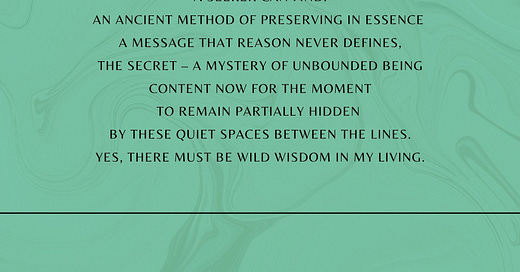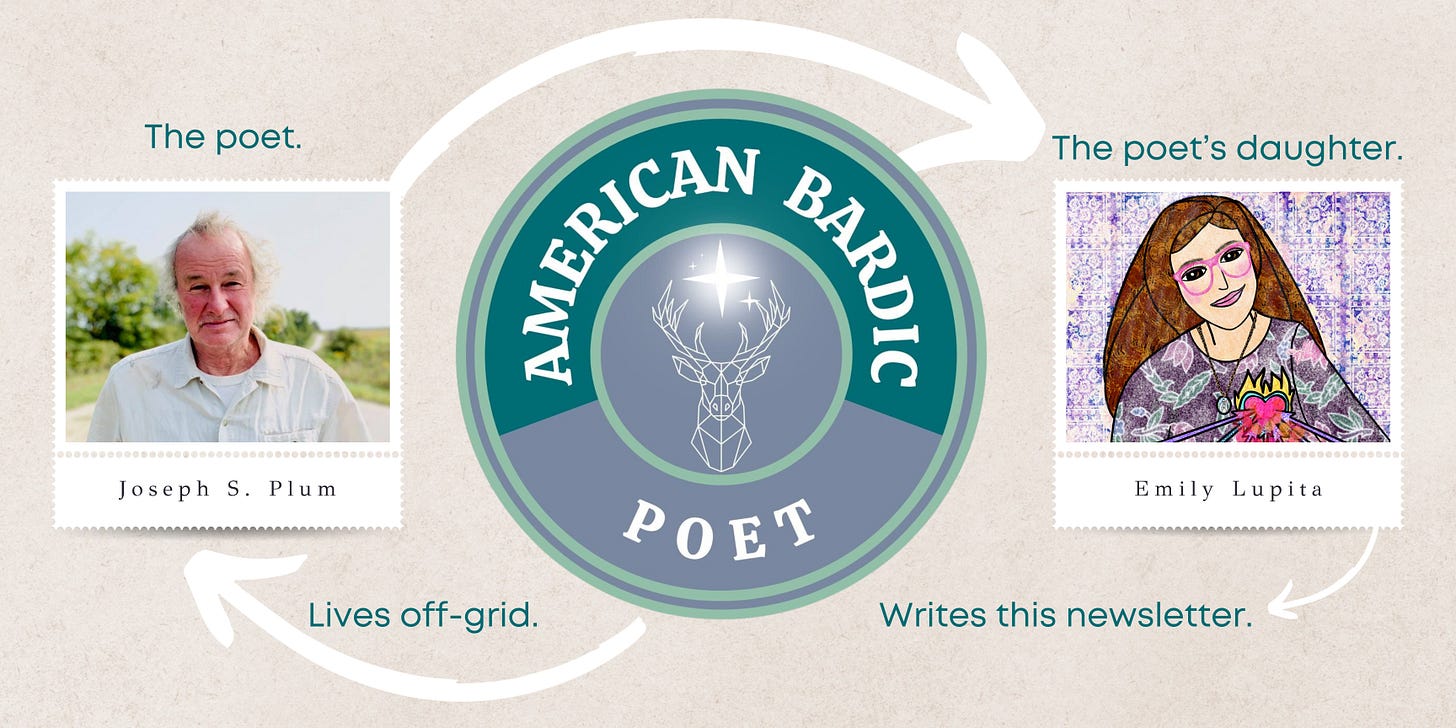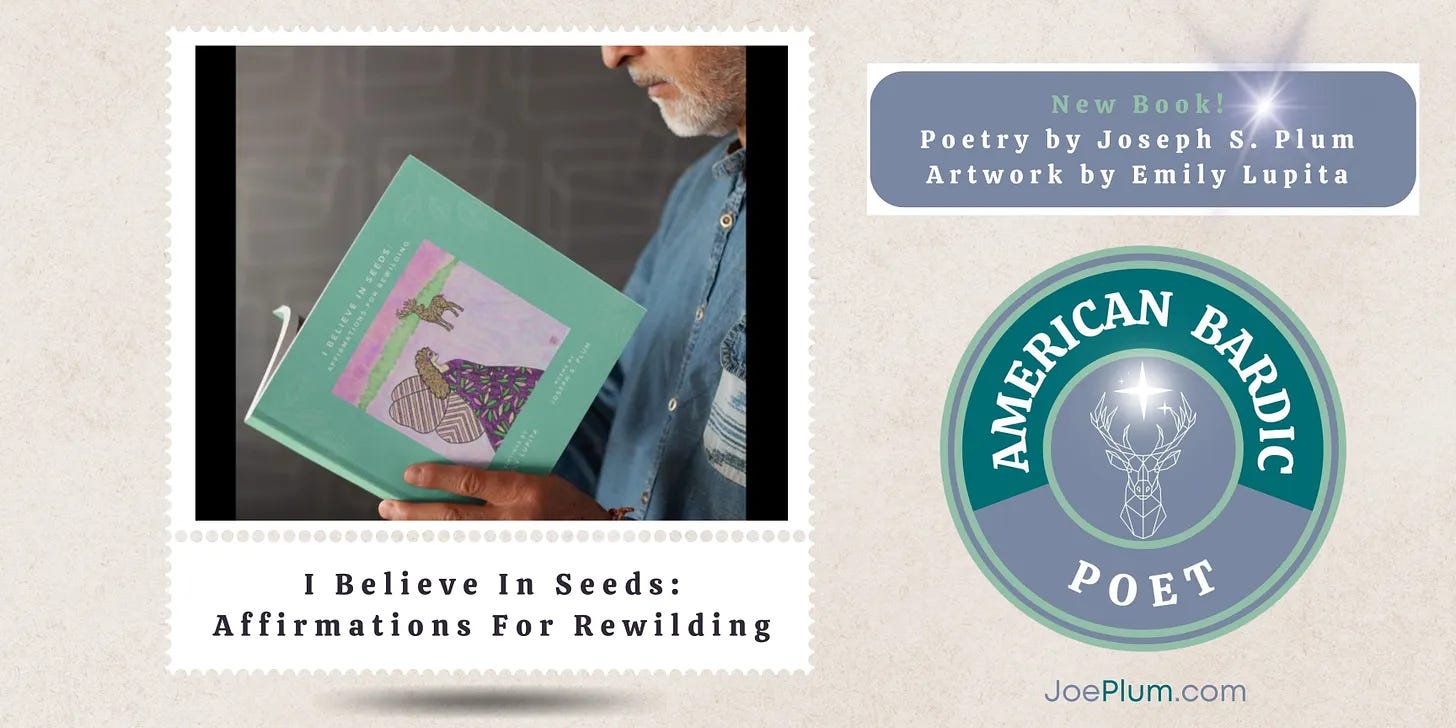Welcome:
Greetings and welcome to American Bardic Poet.
“Wild Wisdom”
This week I share a poem that speaks to the central role that wildness and wilderness plays in Dad’s poetry.
Wild wisdom has been the core teaching - the common thread linking the lessons my father has tried to teach me over the years.
As a child, Dad would take my brothers and me on long walks into the forest and meadows of rural Iowa. We’d run into all sorts of wild animals - from turtles to deer to skunks. We’d dance in rainstorms and dance in blizzards and watch tornadoes up-close.
We were wild in the wilderness. This poem gives a glimpse of Dad’s philosophy behind this way of life.
Good journey,
(The poet’s daughter.)
Wild Wisdom
there must be wild wisdom in my living,
a pathway of memory skillfully outlined,
enduring words of deep understanding
fleshed out in feelings - sweet and sublime,
a pulsating language of vertical wisdom
unfolding with the greatest treasure
a seeker can find: an ancient method of preserving
in essence a message that reason never defines,
the secret - a mystery of unbounded being
content now for the moment to remain partially hidden
by these quiet spaces between the lines.
yes, there must be wild wisdom in my living.
Read my post regarding punctuation and editing of the poems here.
Read about the poet and the bees here.
“Forest” by Emily Lupita
Most of the other kids at school thought that the countryside where I lived must be a boring place full of nothing in the middle of nowhere.
“How can you stand not being able to watch cartoons when you wake up in the morning?” they asked.
“I can’t believe you’ve never been to Adventure Land! What do you do for fun?” they asked.
“Don’t you get bored with nothing to do all day?” they asked.
“Of course not,” I’d say, and begin to tell a story about crawling under giant mushrooms or catching karmic fish. The other kids at school reacted in different ways to the stories I’d tell. Some kids thought I was interesting and cool. Some just laughed at me. Others were cruel and teased me or picked fights and threw rocks at me. And still others were jealous and wanted to trade my mama and dad for their mom and dad, which I never did.
“So, what’s it like in the forest?” they’d ask. “What’s so great about it, anyway?”
The forest, I told them, is full of life. Chipmunks live under the leaves on the ground in the forest. They run back and forth with the thirteen-stripers. Wild roses grow up from the dirt alongside lilacs and tiger lilies and dandelions and brown-eyed Susans. Wild strawberries grow in the forest and they are delicious in summer. So are wild raspberries, blackberries, and cherries. The birds think they are delicious, too.
Sparrows, blue jays, woodpeckers, cardinals, whippoorwills, bobwhites, and hummingbirds fly through the forest, searching for food. At dusk the whip-poor-wills sing, “Whip-poor will, whip-poor will.” And the bobwhites answer back with, “Bob, bob white.” The frogs and toads sing, too, but low in their throats. The crickets sing, too, but they use their legs.
“The crickets even taught me how to use my legs to sing!” I told the kids at school. “I’d show you, but I’m sworn to secrecy.”
All day the woodpeckers tap their songs on the trees in the forest. Bugs scatter out of the trees the woodpeckers tap. Ants and cockroaches and beetles all come running out. Spiders crawl out and bees fly out. Squirrels and rabbits sprint out, too. They run really fast when the dogs chase after them. Not the flying squirrels, though. The flying squirrels jump from branch to branch in the air. They chatter and throw nuts to scare the dogs away from their nests.
Mushrooms grow on the trees holding the squirrels’ nests. There are white mushrooms that taste good in soup and white mushrooms that can kill just by touching them and putting your fingers in your mouth. It is important to know the difference.
“My cousin almost ate an Angel of Death mushroom on a dare, but luckily I talked him out of it just in the nick of time!” I told the kids at school.
Worms live at the base of the trees and crawl just under their roots. Walking sticks and praying mantis are really hard to see, but they live near the trees, too. And centipedes with their hundred legs and caterpillars with their fuzzy striped bodies. The caterpillars are my favorite animals in the whole forest. They are peaceful and quiet. They eat leaves and hold onto the stems of flowers when it rains.
No one in the forest pays any attention to them. Not yet. But the caterpillars will grow wings one day soon. They will grow wings and become the most beautiful creature in the forest. And then they will leave. They will fly right out of the forest and start their journey toward the mountains of Mexico, mountains far away, much farther than anyone could ever imagine.
This is a page from the book, I Believe in Seeds: Affirmations for Rewilding, made possible by a grant from the BeWildReWild Fund at Iowa Natural Heritage Foundation. This book combines my watercolor paintings with Dad’s poems, and gave me a chance to try something different with punctuation. Also, it was such a beautiful moment when Dad saw my paintings and realized his poems were part of his daughter’s artwork.
I’m grateful.
I’ll write more next week. Hope to see you again then. Please consider sharing this post with someone you think may be interested in Dad’s poetry.
🙏🏼 Thank you for gathering here. May it be a blessing. 🙏🏼
About the Poet
Joseph S. Plum is a poet in the bardic tradition. He lives off-grid in rural Iowa and composes his unique chant-like oral poetry for fascinated audiences around the world. Joe has over 16 hours of oral poetry memorized in his head. He pulls from this collection of rhyming lines to compose poems according to the energy of the audience listening. Joe does all of this without writing the poems down on paper or holding any notes.
Joe’s daughter, Emily Lupita, typed up his poems over the years and launched Dreaming Deer Press to publish his work. He now has nine poetry books for sale on Amazon that can be purchased on Joe’s website - here.
🌳












